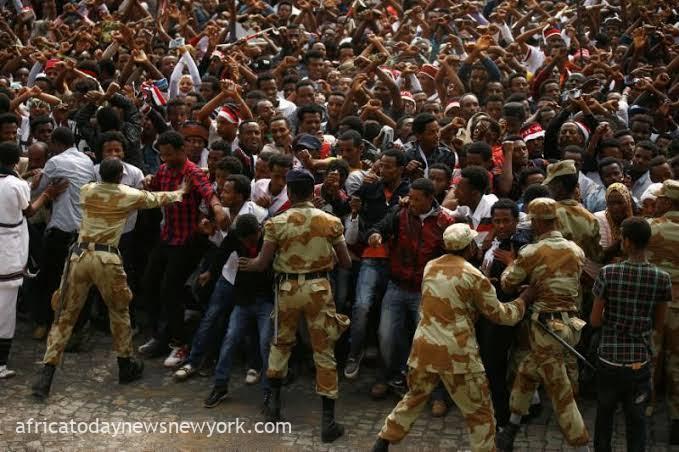In a bid to avert further bloodshed, the African Union (AU) on Friday urged all parties involved in the northern Ethiopia conflict to lay down their arms.
The AU expressed deep concern over the escalating tensions between local communities and called for an immediate end to hostilities, paving the way for constructive dialogue and a lasting peace.
A recent surge in violence has left a trail of devastation in its wake, displacing over 50,000 people in the disputed territories of Alamata Town, Raya Alamata, Zata, and Ofla, according to the United Nations.
The region, claimed by both Tigray and Amhara, has been a flashpoint of tension, with this month’s clashes exacerbating an already volatile situation.
AU Commission chairman Moussa Faki Mahamat “calls on both sides to urgently halt hostilities and ensure the safety of civilians to end the renewed displacement of the local population,” the AU said in a statement.
He also “calls for the commencement of the political dialogue, which is the most viable means to respond to the issues of contested areas”.
During the brutal two-year war between Ethiopia’s central government and Tigray’s regional leaders, Amhara forces made a decisive move, capturing Raya Alamata in southern Tigray. This military maneuver gave them a crucial foothold in the region, further fueling the conflict and its devastating consequences.
Under the terms of a November 2022 peace agreement, Amhara forces, who had supported federal troops during the conflict, were scheduled to pull out of Raya Alamata, a move aimed at defusing tensions and promoting reconciliation. However, the deal’s sluggish implementation has raised concerns about the region’s future.
Read also: 7 Die In Their Sleep Following Building Collapse In Ethiopia
The Amhara regional administration last week accused the Tigray People’s Liberation Front party (TPLF), which controls Tigray, of “invading” Raya Alamata and other areas “which have identity questions”.
Getachew Reda, a senior TPLF member who heads the Tigray regional administration, said on X last week that the recent developments were “the work of diehard enemies of the Pretoria agreement trying to take advantage of real or perceived differences to derail” the peace deal.
The international community has expressed deep concern over the recent reports of fighting, urging all parties involved to cease hostilities and prioritize the safety of civilians
The embassies of several nations including the United States, Japan, Britain and France last week called for dialogue, urging the “de-escalation and protection of civilians”.
Despite repeated requests for information from AFP, both the federal government and Tigrayan authorities have maintained a deafening silence, leaving the identity of the fighters involved in the conflict shrouded in mystery.
The truth about northern Ethiopia remains hidden from view, as a strict media blockade severely limits access to the region, making independent verification of the situation on the ground a near impossibility.
With its rich cultural heritage and diverse population of over 80 ethno-linguistic groups, Ethiopia has struggled to reconcile its varied identities and territorial claims, leading to a complex web of conflicts that threaten the country’s social fabric.
